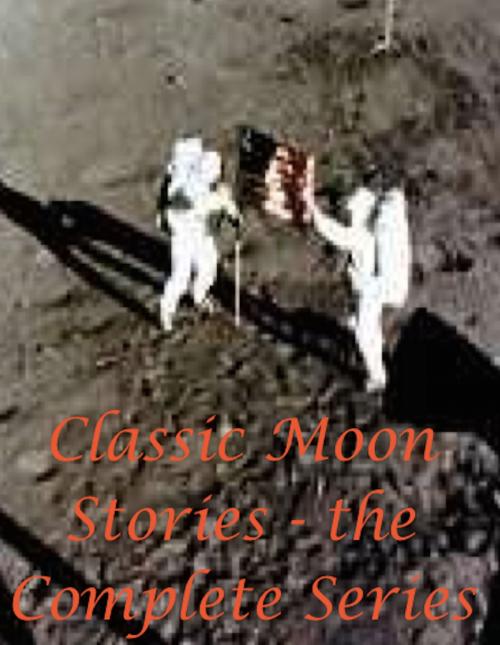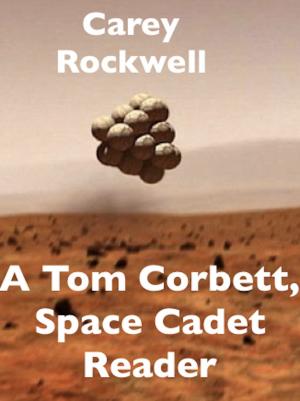Classic Moon Stories - the Complete Series
Science Fiction & Fantasy, Space Opera, Science Fiction, Adventure| Author: | Jules Verne, Garrett P. Serviss, Charles Willard Diffin | ISBN: | 1230000253265 |
| Publisher: | AfterMath | Publication: | July 15, 2014 |
| Imprint: | Language: | English |
| Author: | Jules Verne, Garrett P. Serviss, Charles Willard Diffin |
| ISBN: | 1230000253265 |
| Publisher: | AfterMath |
| Publication: | July 15, 2014 |
| Imprint: | |
| Language: | English |
The stories in the three-volume Classic Moon Stories series continue the pattern established in the two previous anthologies published by AfterMath: the seven volumes of Classic Mars Stories and the three volumes of Classic Venus Stories. This book contains the complete collection of these three volumes.
Volume 1 of the Classic Moon Stories series contains the following complete works:
“Moon Lore,” by Timothy Harley
“Are the Planets Inhabited?,” by E. Walter Maunder
“Trips to the Moon,” by Lucian of Samosata
“The Discovery of a World in the Moone,” by Michael Sparl and Edward Forrest
“Moon Lore” describes many moon-related religious beliefs and superstitions.
“Are the Planets Inhabited?” is a somewhat pedantic speculation that many more recent advances in scientific knowledge have shown to be impossible.
“Trips to the Moon” is the earliest known work to describe a visit to the Moon.
“The Discovery of a World in the Moone” is, in the words of the authors, “a discourse Tending to prove that ’tis probable there may be another habitable World in that Planet.”
Volume 2 of the Classic Moon Stories series contains the following complete works:
“The Moon Metal,” by Garrett P. Serviss
“The Moon Pool,” by Abraham Merritt
“The Moon Rock,” by Arthur J. Rees
“Dark Moon,” by Charles Willard Diffin
“Brood of the Dark Moon,” by Charles Willard Diffin
“The Moon Metal” describes a new metal named “artemisium” whose discovery affects the world economy. The moon and mining play a prominent role.
“The Moon Pool” is a lunar mystery with a biological context that is set in the context of a purported report to a scientific organization.
“The Moon Rock” is a dark tale that focuses on a mysterious Moon rock.
“Dark Moon” involves three intrepid adventurers who take a mysterious voyage.
“Brood of the Dark Moon” is the sequel to “Dark Moon.”
Volume 3 of the Classic Moon Stories series contains the following complete works:
“From the Earth to the Moon,” by Jules Verne
“All Around the Moon,” by Jules Verne
“The First Men in the Moon,” by H. G. Wells
“Trips to the Moon,” by Lucian of Samosata
“From the Earth to the Moon” was one of the most influential science fiction stories ever.. This highly creative novel illustrates why satellites should be launched as close as possible to the equator to take advantage of the Earth’s rotational speed, a choice made by the National Aeronautics and Space Administration for many of its launches.
“All Around the Moon,” also by Jules Verne, is the sequel to “From the Earth to the Moon.” It includes a description of water landings of spacecraft, a common sight for modern astronaut landings.
“The First Men in the Moon” describes H. G. Wells’ distinctive views of the potential for human colonization of the Moon.
“Trips to the Moon” is interesting as description of a space trip that he imagined more than 1,800 years ago.
The stories in the three-volume Classic Moon Stories series continue the pattern established in the two previous anthologies published by AfterMath: the seven volumes of Classic Mars Stories and the three volumes of Classic Venus Stories. This book contains the complete collection of these three volumes.
Volume 1 of the Classic Moon Stories series contains the following complete works:
“Moon Lore,” by Timothy Harley
“Are the Planets Inhabited?,” by E. Walter Maunder
“Trips to the Moon,” by Lucian of Samosata
“The Discovery of a World in the Moone,” by Michael Sparl and Edward Forrest
“Moon Lore” describes many moon-related religious beliefs and superstitions.
“Are the Planets Inhabited?” is a somewhat pedantic speculation that many more recent advances in scientific knowledge have shown to be impossible.
“Trips to the Moon” is the earliest known work to describe a visit to the Moon.
“The Discovery of a World in the Moone” is, in the words of the authors, “a discourse Tending to prove that ’tis probable there may be another habitable World in that Planet.”
Volume 2 of the Classic Moon Stories series contains the following complete works:
“The Moon Metal,” by Garrett P. Serviss
“The Moon Pool,” by Abraham Merritt
“The Moon Rock,” by Arthur J. Rees
“Dark Moon,” by Charles Willard Diffin
“Brood of the Dark Moon,” by Charles Willard Diffin
“The Moon Metal” describes a new metal named “artemisium” whose discovery affects the world economy. The moon and mining play a prominent role.
“The Moon Pool” is a lunar mystery with a biological context that is set in the context of a purported report to a scientific organization.
“The Moon Rock” is a dark tale that focuses on a mysterious Moon rock.
“Dark Moon” involves three intrepid adventurers who take a mysterious voyage.
“Brood of the Dark Moon” is the sequel to “Dark Moon.”
Volume 3 of the Classic Moon Stories series contains the following complete works:
“From the Earth to the Moon,” by Jules Verne
“All Around the Moon,” by Jules Verne
“The First Men in the Moon,” by H. G. Wells
“Trips to the Moon,” by Lucian of Samosata
“From the Earth to the Moon” was one of the most influential science fiction stories ever.. This highly creative novel illustrates why satellites should be launched as close as possible to the equator to take advantage of the Earth’s rotational speed, a choice made by the National Aeronautics and Space Administration for many of its launches.
“All Around the Moon,” also by Jules Verne, is the sequel to “From the Earth to the Moon.” It includes a description of water landings of spacecraft, a common sight for modern astronaut landings.
“The First Men in the Moon” describes H. G. Wells’ distinctive views of the potential for human colonization of the Moon.
“Trips to the Moon” is interesting as description of a space trip that he imagined more than 1,800 years ago.















